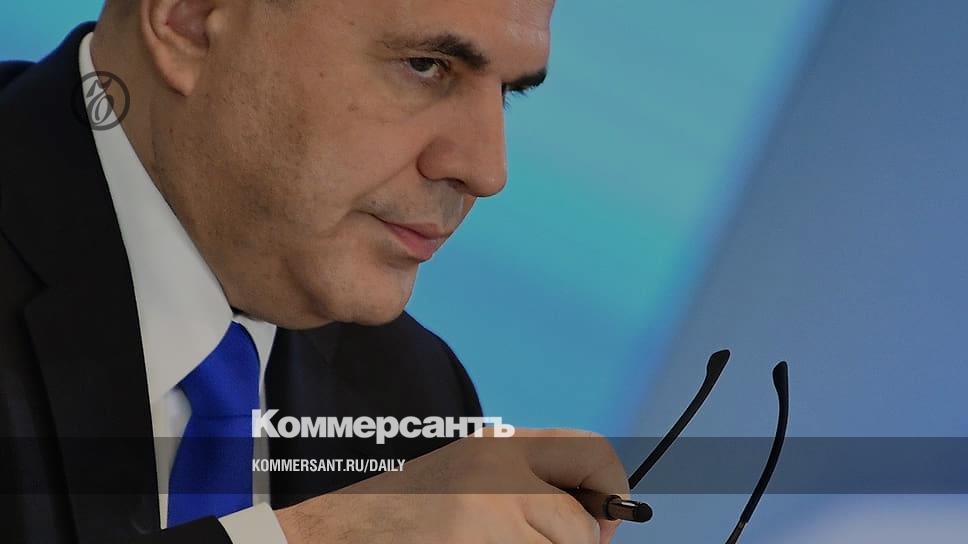The White House is shifting the work on creating measures to counteract the impact of sanctions on the economy to an operational headquarters mode, based on the government commission that handled support measures during the pandemic. The government's approach in this area remains focused on addressing the impact of the pandemic, with plans to reintroduce loans for strategic enterprises and small businesses, as well as credit holidays.
Prime Minister Mikhail Mishustin shifted the anti-sanctions efforts of the White House to the same mode used during the fight against the coronavirus pandemic.
Photo: Alexander Miridonov, Kommersant
Prime Minister Mikhail Mishustin transferred the counter-sanctions activity of the White House to the same regime that was in place in the fight against the coronavirus pandemic
Photo: Alexander Miridonov, Kommersant
The government conducted a regular economic meeting to discuss the measures being prepared under the new comprehensive plan to reduce the impact of sanctions. Organizational measures were first announced yesterday.
Prime Minister Mikhail Mishustin announced the transfer of the government commission's work on improving economic sustainability to the operational headquarters.
This structure was previously used in developing support measures during the pandemic. The Prime Minister highlighted the work done to counteract sanctions within this framework. The Operational Headquarters will meet regularly. The commission was previously headed by First Deputy Prime Minister Andrei Belousov, but now the Prime Minister will lead the work. Andrei Belousov will be his deputy for macroeconomic issues and federal measures, while Moscow Mayor Sergei Sobyanin will coordinate decisions at the regional level.
The government is still discussing measures to respond to sanctions, including the mandatory sale of 80% of foreign exchange earnings, a new capital amnesty, and the allocation of 1 trillion rubles from the FNB for repurchasing company shares that declined due to sanctions. Emergency measures also include temporary restriction of foreigners' exit from Russian assets. Support for enterprises and investment activity has been promised at a conceptual level, with concrete solutions still being developed.see “Kommersant” dated March 1) the government also intends to allocate 1 trillion rubles. from the FNB for repurchase of company shares, which collapsed against the backdrop of sanctions. The list of emergency measures includes temporary restriction of exit of foreigners from Russian assets.
Support for enterprises and investment activity has so far been promised only at a conceptual level – concrete solutions, apparently, are still being worked out.
As the head of the Ministry of Economy Maxim Reshetnikov said on Instagram, as part of the preparation of a comprehensive business support plan, the government also “continues the logic of anti-COVID measures.” For backbone enterprises, Mikhail Mishustin noted, two groups of initiatives have been formed: targeted assistance to organizations in a difficult situation due to sanctions, and general economic measures. The Ministry of Economy explained to Kommersant that the department, on behalf of Andrei Belousov, is working “on the resumption of targeted measures to support backbone enterprises.” It should be noted that now there are almost 1.4 thousand such organizations. In the “covid” year 2020, a separate package of state support was formed for them, including tax deferrals, state guarantees on loans, and soft loans. According to Maxim Reshetnikov, while the ministry is monitoring the state of backbone enterprises, first of all, support (in particular, the minister promises assistance in obtaining soft loans) will affect those companies that “may have failures in their supply chains.”
Approximately in the same vein, support is also discussed. small and medium business. According to Mikhail Mishustin, the White House and the Central Bank are considering measures “combining subsidies and funding for banks that work with this sector,” apparently for preferential lending. It is also planned to “revive” credit holidays (deferred payments) – the Central Bank previously reported that they would last until the end of 2022. Yesterday, Anatoly Aksakov, head of the State Duma’s financial committee, specified that changes to the law would be made “in the near future.” The government does not stop the planned work to remove administrative barriers and excessive requirements, support investment projects, and simplify public procurement procedures.
The counter-sanctions activity of the White House is accompanied by informational: Yesterday, Deputy Prime Minister Dmitry Chernyshenko announced the launch of the “Explain.rf” resource – it is intended to become a “source of verified” information about what is happening.
Evgenia Kryuchkova




